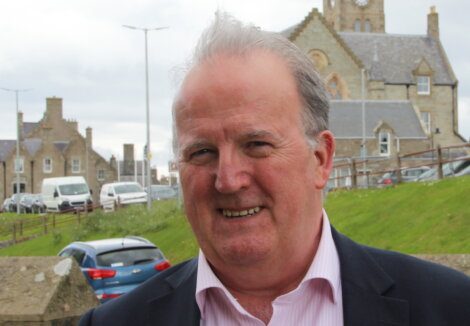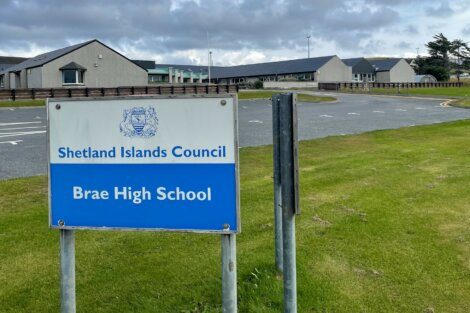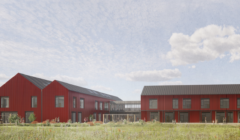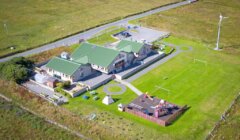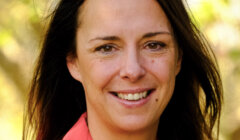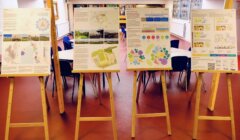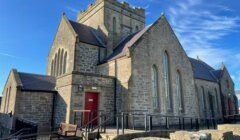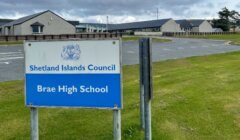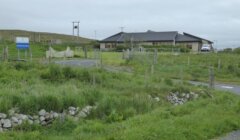Council / Recovery from pandemic key for new education and families chair
THE NEW chairman of the Shetland Islands Council’s education and families committee says he wants “no-one left behind” in the recovery from the Covid pandemic.
Davie Sandison said that when it comes to children’s health and wellbeing there are “underlying things that have been going on over the last couple of years that will take an awful long time to recover from”.
But he said it is not just children, with families affected too. “There’s an awful lot of really, really stressed situations, there’s an awful lot of indications of increased mental health issues, particularly among young folk.
“We need to understand what the real situation is and if there’s anything additional that we need to do,” he said.
Sandison was appointed chair of the committee with the largest budget at the first full council meeting of the new term on Monday.
Having served ten years on the committee already, he believes he has the experience to take on the role after his predecessor George Smith stepped down.
An immediate priority is recovering from the Covid pandemic, while another related matter for Sandison is taking action to address a fall in literacy and numeracy in primaries.
Net zero targets and early years expansion are also on his mind.
The committee is wide-ranging and, as Sandison says, it is “not just about the schools”. Also under the remit are aspects of social care, child poverty and youth and employability services.
“It’s an immense piece of work, and it’s also tackling some of the more vulnerable elements in our community and supporting them,” Sandison said. “So, there’s a real breadth of activity.”
He dismissed any suggestion of a conflict of interests, given that he is involved with UHI Shetland as well as a director of the Hame Fae Hame childcare provider in Scalloway.
Become a member of Shetland News
Sandison stressed that over the last decade as a councillor he has always removed himself from any discussions that may present a conflict of interests and has been “absolutely scrupulous” in doing so.
Meanwhile one highlight for Sandison in the last council term was the opening of a new children’s residential unit in Tingwall.
“The simple fact is that remarkably we now have next to no children having to go off island for residential care,” he said.
“It’s made a seismic change about how deliver that particular requirement.”
Part of the job is also the external dialogue with government – and in particular for Sandison this will revolve around continuing to make the case for a fair allocation of funding.
He points towards the pupil equity funding scheme, which gives local authorities extra cash depending on the number of children receiving free school meals – with the criticism being that Shetland gets an unfair deal.
There will also be talks with the Scottish Government over a proposed new Brae school – a project still in its early stages.
But Sandison said it is the top priority in the council’s learning estate, and he expects the SIC to be in a position to bid for funding by the end of the year.
Meanwhile, Sandison will be supported by fellow Shetland Central councillor Catherine Hughson, who was given the vice-chair role.
The other councillors on the committee are Tom Morton, Liz Peterson, Moraig Lyall, John Fraser, Stephen Leask, Bryan Peterson, Emma Macdonald and Neil Pearson.
It will continue to include three unelected religious representatives – a divisive topic which Sandison believes is an “anachronism” stemming from outdated Scottish legislation.
“I am extremely open minded about allowing people to participate in democracy, so I’m not wanting to paint folk into corners,” he said, “but it’s something that needs a review, it has to be dealt with at a national level.”
In the meantime though Sandison will “make sure that those [religious] members of the committee can be heard on specific education matters”.
The issue was raised at Monday’s meeting by Lerwick member Gary Robinson, who said it was unfair religious representatives can vote on education issues but Scottish Youth Parliament members – who have the status of observers – cannot.
The Humanist Society Scotland meanwhile has called on all local authorities to scrap the voting rights of unelected religious representatives from education committees.
The Scottish Government said in 2019 that voting rights are committees “are a matter for each local authority”.
Governance and law manager Jan Riise told Monday’s meeting that in addition to the matter being raised with local authority group COSLA another opportunity is looking at the SIC’s own constitution.
Become a member of Shetland News
Shetland News is asking its readers to consider paying for membership to get additional perks:
- Removal of third-party ads;
- Bookmark posts to read later;
- Exclusive curated weekly newsletter;
- Hide membership messages;
- Comments open for discussion.
If you appreciate what we do and feel strongly about impartial local journalism, then please become a member of Shetland News by either making a single payment, or setting up a monthly, quarterly or yearly subscription.






